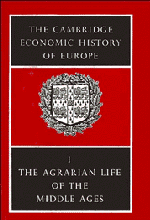Book contents
- Frontmatter
- Chapter I The Settlement and Colonization of Europe
- Chapter II Agriculture and Rural Life in the Later Roman Empire
- Chapter III The Evolution of Agricultural Technique
- Chapter IV Agrarian Institutions of the Germanic Kingdoms from the fifth to the ninth century
- Chapter V Agrarian conditions in the Byzantine Empire in the Middle Ages
- Chapter VI The Rise of Dependent Cultivation and Seignorial Institutions
- Chapter VII Medieval Agrarian Society in its Prime
- §1 France, The Low Countries, and Western Germany
- §2. Italy
- §3 Spain
- §4 The lands east of the Elbe and German colonization eastwards
- §5 Poland, Lithuania and Hungary
- §6 Russia
- §7 England
- §8 Scandinavia
- Chapter VIII Crisis: From the Middle Ages to Modern Times
- BIBLIOGRAPHIES
- Plate Section
- The Roman frontier and the Teutonic Tribes in the first and fourth centuries A.D.
- The Empire of Charles the Great
- Germany in the thirteenth century
- References
§2. - Italy
from Chapter VII - Medieval Agrarian Society in its Prime
Published online by Cambridge University Press: 28 March 2008
- Frontmatter
- Chapter I The Settlement and Colonization of Europe
- Chapter II Agriculture and Rural Life in the Later Roman Empire
- Chapter III The Evolution of Agricultural Technique
- Chapter IV Agrarian Institutions of the Germanic Kingdoms from the fifth to the ninth century
- Chapter V Agrarian conditions in the Byzantine Empire in the Middle Ages
- Chapter VI The Rise of Dependent Cultivation and Seignorial Institutions
- Chapter VII Medieval Agrarian Society in its Prime
- §1 France, The Low Countries, and Western Germany
- §2. Italy
- §3 Spain
- §4 The lands east of the Elbe and German colonization eastwards
- §5 Poland, Lithuania and Hungary
- §6 Russia
- §7 England
- §8 Scandinavia
- Chapter VIII Crisis: From the Middle Ages to Modern Times
- BIBLIOGRAPHIES
- Plate Section
- The Roman frontier and the Teutonic Tribes in the first and fourth centuries A.D.
- The Empire of Charles the Great
- Germany in the thirteenth century
- References
Summary
Geography and history
The natural background
In his commentary on Dante's Divine Comedy, the fourteenth-century humanist, Benvenuto da Imola, describes Italy as ‘a house of many mansions’. Starting from Rome, the arx sive caput, he proceeds to show how each region has been assigned its place in a naturally ordered household. Thus Tuscany is the bedchamber ‘because it is the fairest province’, and Lombardy is the banqueting hall, ‘because Lombards are given to feasting and large appetites’; Romagna is the fruit garden because it is ‘fertile in every part’ and the March of Ancona is the cellarium, ‘because it has the sweetest wines, oil, and figs’; Apulia finally is the stable, ‘because there are found the noblest horses, copious forage and wide, level fields’ and the March of Treviso is the pleasure garden ‘because of its lofty woods’. Composed barely twenty years after the Black Death, the purpose of this pedestrian rhetoric, as of most past writing on Italy, was to praise not to instruct. Instructive it is, nevertheless, that of all things in Italy Benvenuto should have chosen to emphasize the regional diversity; for in the history of Italy, and especially rural Italy, the first and most conspicuous fact is the inexhaustible variety of local development. Even today past and present are found incongruously mixed, while whole centuries divide the North, where the Agricultural Revolution made some of its earliest conquests, from the South and islands, which have yet to be subdued. In Sicily land continues to be tilled with a 'pre-Adamite' Hakenpjlug (aratro chiodo) , in Sardinia ox-carts of Roman name and design are still in common use, and in parts of the mainland archeologists may study 'Vergilian' ploughs and Roman types of oil press still at work. In Central Italy medieval forms of tenancy have been uneasily adapted to the needs of mechanized farming, while in Southern Italy the problem of latifundia has defied solution from the Roman to the Italian Republic.
Keywords
- Type
- Chapter
- Information
- Publisher: Cambridge University PressPrint publication year: 1966
References
- 4
- Cited by

